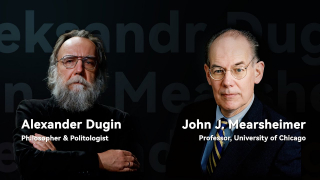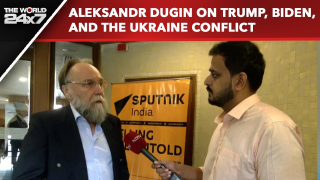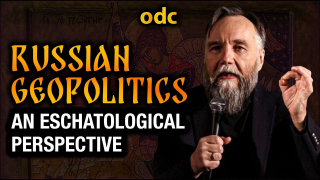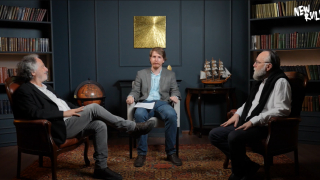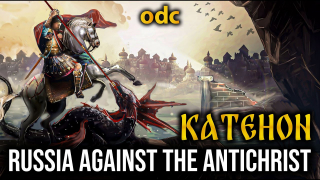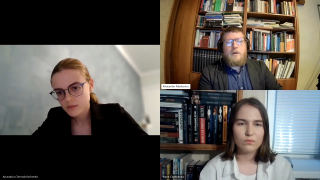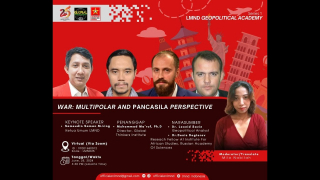Geopolitic Academy (1) : War ; Multipolar Dan Pancasila Prespective
The National Student League for Democracy-Liga Mahasiswa Nasional untuk Demokrasi (LMND) in collaboration with the Global Thinkers Institute (GTI) created a geopolitical school program, Geopolicial Academy. On June 25 2024, the first launch was held by holding a discussion, "War; Multipolar and Pancasila Perspective". Presenting speaker, Dr. Denis Degterev (Research Faellow. Institute for African Studies), Dr. Leonid Savin (geopolitical analysist), Muhammad Ma'ruf, Ph.D (Director, Global Thinkers Institute (GTI). The event was opened by Samsudin Saman, M. Ling (General Chair of LMND), Mila (moderator).
Dr. Destegev gave a presentation with the title "Balance of Power on the world stage". It was explained that in a unipolar system, one country controls 50% or more of the world's total power (potential). Meanwhile, in a quasi-unipolar world (pluralistic unipolarity), one country controls 45-50% of the power. Meanwhile, no other country controls more than 25% of power. On the other hand, in a bipolar system, each player controls more than 25% of the total power.
The system of power that applies in unipolar is, "if A has power over B as long as he can force B to do something that B would not do otherwise." In building strength, each country has choices, starting from strengthening state structures, human resources and technology, defense equipment hardware, and strengthening soft power. Among the Global FirePower formula indicators are military, financial, logistical and geographic strength.
The capabilities of a country can be seen from the TPR (Total Population Rate), UPR (Urban Population Rate), ECR (Energy Consumption Rate) – part of a country's primary energy consumption; MER (Military Expenditure Rate) – share of national military expenditure in the world; MPR (Military Personnel Ratio) – the proportion of national armed forces personnel to personnel of all armed forces in the world. Judging from this indicator, NATO, 25.6%, G7, 23.2%, and BRICS 37.5%.
Dr Leonid Savin emphasized the importance of understanding and identifying the emergence of a multipolar world caused by the aggressiveness of the western unipolar world. The expansion of security, economics and the spread of western liberal democracy have threatened the identity, sovereignty and justice of every country.
Due to the expansion of western liberal democracy which is totalitarian in nature accompanied by the expansion of economic security, an idea of an integrated security system between multipolar countries is needed so that the security of each country is independent.
The existence of western private military companies causes the "state" to be used to carry out the company's missions. The spread of multicultural ideas and IT technology companies make the spread of social media a tool of liberal democracy in the name of multiculturalism.
The Euroasia movement is an example of a movement to strengthen coordination among countries that have the same ideas about a multipolar world. Indonesia is a large country with cultural, ethnic, religious and biological diversity which should build its country based on Indonesian civilization, not totalitarian liberal western civilization. BRICS and Shanghai Cooperation are other examples of strengthening multipolar economies.
Muhammad Ma'ruf, gave several points of response regarding the material of the two speakers. First, the level of response and narrative of the emergence of a multipolar world varies from country to country. Asian and ASEAN countries, especially the Indonesian public, do not yet have sufficient awareness. Signs of a unipolar world collapse have not yet entered public discourse.
Second, countries that have low military and economic capabilities, do not want to take risks, and still maintain patronage with western powers. Third, Indonesia has historical roots as a pioneer of the resistance movement against colonialism (Bandung Summit, 1955).
Fourth, the eradication of colonialism is the highest constitutional mandate of the Indonesian state so that it becomes a supporting force for the formation of a multipolar world. The five basic principles of the Indonesian state are manifestations of the ideology of Pancasila, the upholding of global justice based on divinity, humanity and unity.
Fifth, the value base of the multipolar world and Pancasila are not contradictory, but they are also not identical, because Pancasila was born from the essence of the trust of people's suffering as a result of the historical process of resistance to colonialism. Pancasila is the local wisdom of the Indonesian people which synergizes with the wisdom of universal values in a multipolar world. If Indonesia is very open, even implementing liberal democracy, why not open itself to the idea of multipolar values that are in line with Pancasila values.

